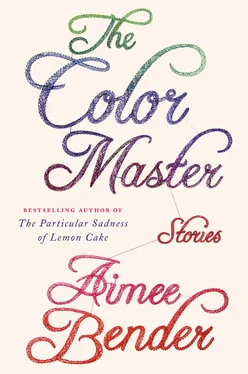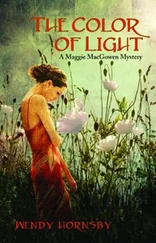“I like that word, option ,” I said.
“Are you kidding me?”
“ Optional ,” I said. “ Opt. Opting . Nice.”
She poured herself a second glass of wine.
“I’m so sick of dating,” she said, leaning back in her chair and lifting up her legs to sit cross-legged.
“Online?”
“Yeah,” she said, sighing. “Even me. Even me, online. Fine. I hate picking a name for myself, you know? Yesterday I saw a man and his Internet name was Fido. What am I supposed to do with that?”
“What’d you name yourself?”
“Nothing.”
“You have to name yourself something,” I said. “Or they don’t let you on the site.”
She finished her wine. Eyed the bottle. I refilled both of us, so it looked like it wasn’t just her.
“Wordkeeper,” she said.
“Your dating name is Wordkeeper?”
“Shut up,” she said.
“Sex-y,” I said.
“Well, maybe to someone it will be.” She took off her glasses, and touched the middle top of her nose, a geste she does that I do like.
“It has a little bit of a dom tone,” I said, sipping. “Like you’re hoarding all the words and you’ll give them out when you feel like it. Some guys will like that.”
She had her eyes closed. She was thinking something private.
“Some guys,” she said.
I went to open a bag of peanuts and poured them into a bowl. Susan and I have talked about dating since that one thing, but I have always said no. I’m not completely sure why. We’re like the couple on the sitcom that has good sparks but never get together for the sake of ratings.
“You know I can’t,” I said, putting the bowl on the table. “I’m your neighbor.”
“So?” she said. She opened her eyes. “We get along. I see you almost every day.”
“Too risky.”
“That is such bullshit!” she said. She glared at the table. She began to shell peanuts. “Are you just not … attracted?”
Susan is a good-looking woman, I’ll give her that. She wears blouses with one button unbuttoned right where you’d want that to happen. Her glasses make her look like you want to take off her glasses. She gets plenty of dates, or she could, if she wanted.
“You’re smug,” I said. I laughed at myself, surprised.
“What do you mean?”
“ ‘Wordkeeper’?”
“Is smug?”
I winced. “Yeah,” I said. “Kind of.”
“I’m old-fashioned,” she said. She swept her shells into a little pile.
I smiled, but not an agreement smile.
She shook her head. “I don’t mean to be,” she said. “I just like the feeling of finding the right word in my mind and employing it. I get pleasure from that feeling. I prefer language to gesture. I figured other people might, too.”
“Sure,” I said.
“I don’t think I’m better than you.”
“It’s okay. You probably are.”
We sat there for a while. She liked to run her long nail down the length of each peanut and then open it up like a present.
“I suppose sex is all gesture,” she said.
“Not even really gesture.”
“I guess not. Not indicative at all.”
“No.”
She ate the peanuts. She was flushed from the wine. She wanted to take off her clothes, I could feel it, the same way she was undressing peanuts, and I felt it as cruel then, how I didn’t want to do anything with her. Maybe cruel to both of us. But the truth is, I just felt like I had e-mail to check. I could masturbate faster. It was easier, in terms of fallout. Who wants to be in an argument with a neighbor?
She held the bottom of her wineglass down hard with her fingers, like otherwise she might just fling it across the room.
I checked my phone. Sent a couple of quick texts. After a few minutes, she left.
The phone is about the same size as a cigarette pack. It’s no surprise to me that the traditional cigarette lighter in many cars has turned into the space we use to recharge our phones. They are kin. The phone, like the cigarette, lets the texter/ former smoker drop out of any social interaction for a second to get a break and make a little love to the beautiful object. We need something, people. We can’t live propless.
It wouldn’t bother me except it bothers me. In the shower I gave myself a test. That stuff I put in my hair for suds? Is called shampoo. The silver tray hanging over the shower top? Is a caddy. The string I use to get crap out of my teeth? Is known as dental floss. She’s in my head all day, Susan, so why have sex with her too? All day I hear her chiding me.
She doesn’t come over for a few days, which is unusual. On Saturday I walk up to her place. I had a dream about her and it was nice, and in the interest of living in the moment, I made a tray of chocolate-dipped strawberries. I made them Friday night. Good chocolate. Good with wine. Organic strawberries, because they are very high on the pesticide list otherwise. She opens the door.
“Yeah?” she says.
She looks tired. Her hair is less planned than usual. I step in. I give her the tray.
“You brought me these?” she says, suspicious.
“I did.”
“What for?”
I was in the middle of her living room. I had had a plan, I knew that. But the rest of it had vanished.
Our store was expensive, I mean Ex-Pen-Sive, as anything would be if all its requests were for clothing in the colors of natural elements. The duke wanted shoes the color of rock, so he could walk in the rock and not see his feet. He was vain that way; he did not like to see his feet. He wanted to appear, from a distance, as a floating pair of ankles. But rock, of course, is many colors. The distinction’s subtle, but it is not just one plain gray, that I can promise, and in order to truly blend, it would not do to give the duke a regular pair of lovely pure-gray-dyed shoes. So we had to trek over as a group to his dukedom, a three-day trip, and take bagfuls of rocks back with us, and then use them, at the studio, as guides. I spent five hours one afternoon just staring at a rock, trying to see into its color scheme. Gray, my head kept saying. I see gray.
At the shop, in general, we build clothing and shoes—shirts and coats, soles and heels—we treat the leather, shape and weave the cloth, and even when an item isn’t ordered as a special request, one pair of shoes or one robe might cost as much as a pony or a month’s food from the market stalls. Most villagers do not have this kind of money, so the bulk of our customers are royalty, or the occasional wealthy traveler riding through town who has heard rumors of our skills.
For the duke’s shoes, all of us tailors and shoemakers, who numbered about twelve, were working round the clock. One man had the idea to grind bits of rock into particles and then add those particles to the dye-washing bin. This helped a little. We attended visualization seminars where we tried to imagine what it was like to be a rock, and then, quietly, after an hour of deep thought and breathing, returned to our desks and tried to insert that imagery into our decision about how long to leave the shoes in the dye bath. We felt the power of the mountain in the rock, and let that play a subtle subtextual role. And then, once the dye had reached ultimate intensity, and once the shoes were a beautiful pure gray, a rocky gray, but still gray, we summoned the Color Master.
She lives about a half mile away, in a cottage behind the scrub-oak grove. We summon her by sending off a goat down the lane, because she does not like to be disturbed by people, and the goat trots down the road and butts on the door. The Color Master set up our studio and shop in the first place, years ago; she has always done the final work. But she has been looking unwell these days. For our last project—the duchess’s handbag that was supposed to look like a just-blooming rose—she wore herself out thinking about pink, and was in bed for weeks after, recovering. Dark circles ringed her eyes. She is growing older. Also, her younger brother suffers from terrible back problems and cannot move or work and lives with her, lying on the sofa all day long. She is certainly the most talented in the kingdom, but gets zero recognition. We, the tailors and shoemakers, we know of her gifts, but does the king? Do the townsfolk? She walks among them like an ordinary being, shopping for tomatoes, and no one knows that the world she’s seeing is about a thousand times more detailed than the world anyone else is looking at. When you see a tomato, like me, you probably see a very nice red orb with a green stem, fresh and delectable. When she sees a tomato, she sees blues and browns, curves and indentations, shadow and light, and she could probably even guess how many seeds are in a given tomato based on how heavy it feels in her hand.
Читать дальше












